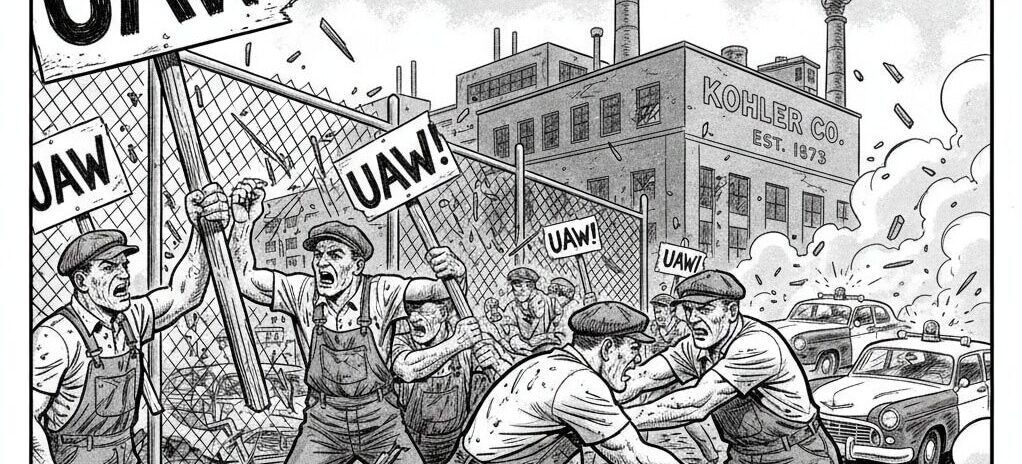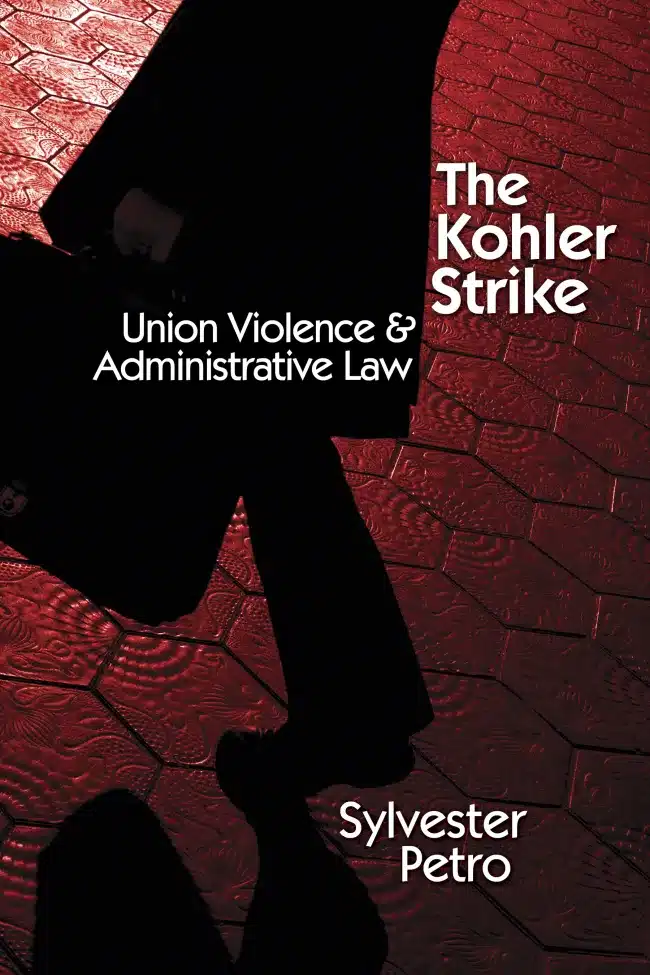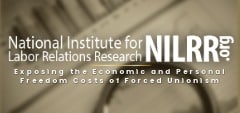Abolish the NLRB — The Kohler Strike – Union Violence and Administrative Law by Sylvester Petro


End the NLRB and help End Union Violence, a summary of “The Kohler Strike: Union Violence and Administrative Law” by Sylvester Petro
The Kohler Strike: Union Violence and Administrative Law, published by Sylvester Petro, a professor of law at New York University, critically examines the prolonged labor dispute between the Kohler Company and the United Automobile Workers (UAW) union. The strike, beginning in 1954, lasted over six years. Petro draws from official documents, hearing transcripts, and firsthand investigations to expose, in his view, “the fundamental flaws of U.S. labor policy and the problematic role of administrative agencies like the National Labor Relations Board (NLRB).”[i]
The Kohler Strike: Union Violence and Administrative Lawbook is divided into three parts.
Part I provides historical context on the Kohler Company and its village in Wisconsin, portraying it as a model of progressive employer practices with high employee loyalty and generous benefits since its founding in 1873.[ii] It details the events leading up to the strike, including the UAW affiliation (1952), failed contract negotiations over wages, seniority, pensions, arbitration, insurance, and union security (compulsory membership), and the strike’s outbreak on April 5, 1954.[iii] Petro describes the UAW’s tactics, including mass picketing, violence against non-strikers, and a nationwide boycott, as well as the failure of local authorities to intervene, reportedly “due to political ties”.[iv]
Part II analyzes the NLRB’s 1960 decision, which Petro calls “biased and unjust”.[v] The Board ruled Kohler engaged in unfair labor practices, which, according to Petro, “justified back pay for strikers, while ignoring union violence and rewarding misconduct”.[vi]
Part III addresses broader issues, contending that “labor laws enable unions to ‘win’ strikes through coercion rather than persuasion” and condemning administrative law as “politicized and prejudicial”.[vii] Petro calls for restoring judicial authority to constitutional courts, reducing union privileges, and reforming policies that tolerate violence.
Petro concludes that the Kohler case exemplifies “government favoritism toward unions, the erosion of individual rights, and the dangers of administrative overreach,” urging a “return to the rule of law to protect free enterprise and personal freedoms”.[viii]
The Perils of Compulsory Unionism: An Assault on Individual Liberty and First Amendment Rights
Petro strongly decries compulsory unionism, claiming it undermines “the foundational principles of American jurisprudence—individual autonomy, freedom of association, and the rule of law”. He states, “nowhere is this more evident than in the regime of compulsory unionism, where workers are coerced into funding and affiliating with unions against their will”. According to Petro, forced dues, union security clauses, and compulsory collective bargaining “strip employees of freedom of choice,” causing both economic and psychological harm and violating core First Amendment protections against compelled speech and association.[ix]
The Essence of Compulsory Unionism and Its Harms
Compulsory unionism is said to manifest through “union shop clauses, agency fees (prior to the 2018 Janus v. AFSCME decision for public sector workers), and mandatory dues checkoffs that are difficult to revoke”.[x] The end result is that “workers lose agency… becoming unwitting funders of organizations they may oppose”. Petro asserts, “forced dues siphon wages—often hundreds of dollars annually—from workers who receive no commensurate benefit”.[xi] The UAW, for instance, demanded union security provisions that would have mandated membership or dues payment for all employees. Kohler management resisted, viewing this as “an immoral imposition on workers’ rights”.[xii]
Socially, this coercion fosters division. Those who cross picket lines face stigmatization—”No one has a right to scab despite the law,” UAW official Emil Mazey declared during the dispute. [xiii] Petro documents “over 400 incidents of union-orchestrated terror, including assaults on elderly workers and property destruction”.[xiv]
In the Kohler case, forced union security demands prolonged the strike, costing workers years of income while union leaders amassed power. Voluntary dues would have compelled the UAW to negotiate persuasively, avoiding such devastation.
First Amendment Violations: Compelled Speech and Association
The First Amendment “safeguards not just speech but also the right not to speak or associate”. The Supreme Court recognized, in West Virginia State Board of Education v. Barnette (1943): “If there is any fixed star in our constitutional constellation, it is that no official, high or petty, can prescribe what shall be orthodox in politics, nationalism, religion, or other matters of opinion or force citizens to confess by word or act their faith therein”. Compulsory unionism, Petro contends, “flouts this by forcing workers to fund union advocacy… that they may abhor”. The principle was reaffirmed by Janus v. AFSCME (2018), which declared forced public sector agency fees unconstitutional compelled speech.[xv]
The Kohler Strike as a Cautionary Tale
The Kohler strike, spanning six years, illustrates these harms. Americans, fathers, mothers, sons, and daughters resisting union coercion were harassed, and met with UAW goon violence. According to Petro, the NLRB’s decision “exacerbated the injustice, faulting Kohler for ‘unfair practices’ while downplaying union violence and ordering reinstatement of those engaged in misconduct”.[xvi]
Toward Reform
Petro advocates for prohibiting all forms of forced dues nationwide and extending Janus-like protections to the private sector, stating, “Congress should amend the National Labor Relations Act,” and states should “enact universal right-to-work laws”. Administrative agencies such as the NLRB should cede authority to impartial courts.[xvii]
Expanding the Case: Economic, Legal, and Ethical Imperatives
Economic studies, Petro and others argue, show that “right-to-work laws… create stronger labor markets, higher employment rates, and improved mobility, without sacrificing worker protections”. Court precedents such as Communications Workers v. Beck (1988) and Lavigne v. Ontario Public Service Employees Union (1991), reinforce the First Amendment issues arising from forced dues.
Ethically, forced dues “undermine human dignity by treating workers as revenue sources” and “incentivize corruption, as unions with guaranteed funds face less scrutiny”.[xviii]
Policy recommendations include federalizing right-to-work legislation and amending the NLRA.
Ethically, forced dues undermine human dignity by treating workers as revenue sources rather than free agents. They foster corruption, as unions with guaranteed funds face less scrutiny—evident in scandals like the UAW’s embezzlement cases. Voluntary dues would incentivize transparency and service, benefiting all.[xix]
Policy-wise, nationwide Right to Work legislation [see NRTWA], as in 26 states today, should be federalized via NLRA amendments. This would harmonize rights, boost GDP (per some estimates, RTW adds 1-2% growth), and align with Janus. States like Michigan (which became a right to work state in 2012 and prospered until repeal) proved unions and states can adapt and thrive voluntarily.[xx]
In sum, eliminating forced dues is justified economically (job growth, mobility), legally (First Amendment extension), and ethically (free will). The Kohler tragedy warns of compulsion’s dangers; reform promises a freer, more prosperous labor landscape. As scholars, we must advocate this to safeguard individual rights against collective coercion.[xxi]
The Need to Abolish the NLRB[xxii]
Petro’s solution—outlined in Chapter 10, subsection “A Return to Law”—calls for “abolishing the NLRB not as an isolated action but as the logical outcome of repealing flawed provisions in the National Labor Relations Act and shifting authority back to courts”. He argues that the NLRB “functions like a ‘kangaroo court'” by rewarding misconduct and punishing the innocent.
Sylvester Petro explains the elimination of the National Labor Relations Board (NLRB) as a critical step in restoring the rule of law in labor relations, detailed primarily in Chapter 10’s subsection “4. A Return to Law” (starting on page 110 of the book). Petro frames this as part of a broader reform agenda to address the systemic failures of administrative law, which he argues perverts’ justice through political bias, procedural defects, delays, and unconstitutional overreach. He positions abolishing the NLRB not as an isolated action but as the logical outcome of repealing flawed provisions in the National Labor Relations Act (NLRA) and shifting authority back to constitutional courts. Below, I outline his reasoning step by step, drawing directly from the text for accuracy.
Petro builds his case by first critiquing the NLRB throughout Chapter 10, portraying it as a “doctrinaire bottleneck” that embodies the fundamental defects of administrative law (detailed in subsection 3, pages 104-109).[xxiii] He argues the Board is inherently flawed because:
- It was created under an unworkable NLRA that imposes contradictory mandates, such as requiring “good-faith” bargaining without compelling agreements or concessions, leading to arbitrary interventions (e.g., dictating contract terms like rejecting no-strike clauses).
- Its administrative nature—conducting elections, defining bargaining units, and determining voter eligibility—injects arbitrariness and ideological bias, as these are not truly judicial functions.
- It fails to deliver on promises of expertise, flexibility, and speed, instead producing rigid, politicized decisions, muddied facts (due to lax evidence rules), and extreme delays (e.g., the Kohler case took six years from 1954 filings to the 1960 decision).
- Constitutionally, it usurps judicial power reserved for life-tenured federal courts, creating confusion over fact-finding and enforcement, which results in bottlenecks and coerced compliance even with potentially reversible orders.
Petro summarizes: “In fact, there will be a gain all round. Collective bargaining will proceed more wholesomely and more naturally without the bumbling interventions of the [NLRB]“.[xxiv]
Petro explains that eliminating the NLRB requires first dismantling the NLRA’s “more flagrant and illiberal features,” which sustain the Board’s existence and enable union coercion. Specifically:
- Repeal the Majority-Rule Principle: This NLRA provision allows a union elected by a majority of voting employees to represent “all workers” in a unit, including non-voters and those who oppose the union. Petro calls this coercive and undemocratic, arguing it forces unwanted representation and stifles individual freedom. Repealing it would let unions represent only voluntary members, eliminating the need for Board-supervised elections to determine majority status.[xxv]
- Repeal the Duty to Bargain: The NLRA’s requirement for employers to bargain in good faith (without mandating concessions) has led the Board to overstep by effectively dictating terms, as in Kohler where the company was faulted for not adopting a judge’s suggested offer. Petro argues this cannot be enforced without government-compelled agreements, which contradicts free enterprise. Removing it would prevent the Board from inserting itself into negotiations.
[i] Petro, *The Kohler Strike: Union Violence and Administrative Law* (1961), throughout. Petro’s framing of labor policy and administrative agencies is cited extensively in the book’s introduction and throughout the analysis of NLRB actions, especially in the latter chapters.
[ii] This appears in Part I, sourced from company histories and Petro’s depiction.
[iii] Details provided in Part I, relying on hearing transcripts and official correspondence.
[iv]Drawn from Petro’s analysis of local political involvement and strike documentation.
[v] Explicit language used by Petro when critiquing the Board’s ruling; found in Part II’s analysis.
[vi] Petro’s characterization of the NLRB’s actions appear in details of the 1960 decision and subsequent commentary.
[vii] Petro’s recurring theme; statements found in Part III.
[viii] Derived from the concluding sections of the book
[ix] Petro draws from constitutional law discussion and his critiques of union security arrangements.
[x] Petro’s explanation parallels legal commentaries pre- and post-Janus.
[xi] Petro’s recurring arguments on the effects of compulsory unionism.
[xii] Attributed to company statements and Petro’s summary; found in negotiation transcripts and interviews.
[xiii] Statement attributed to UAW official Emil Mazey; Petro references direct quotes from strike records.
[xiv] Petro’s documentation appears in historical appendices and case studies in Part I/III.
[xv] Janus v. AFSCME, 585 U.S. __ (2018).
[xvi] Petro’s summary and critique post-1960 decision, found in the reform recommendations section.
[xvii] Petro’s policy recommendations, found in Part III and the conclusion.
[xviii] Ethical critique by Petro, supplemented with references to UAW scandals.
[xix] Sourced from economic reports and Petro’s summary of labor market trends.
[xx] Petro, as well as cited economic studies and court precedents, support these assertions.
[xxi] Petro’s summative argument; referenced in the closing chapters.
[xxii] Chapter 10’s subsection “A Return to Law” as primary source.
[xxiii] Petro’s structured critique, drawing from Chapter 10.
[xxiv] Directly quoted from Petro, 1961, Chapter 10.
[xxv] Petro’s recommendations throughout Chapter 10 and reform proposals.

